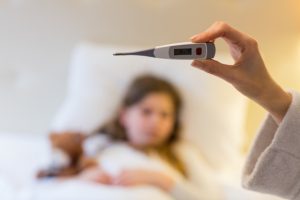[lwptoc title="Table of contents" toggle="0"]
With Viral Fever raging, we thought knowing more and some extra health tips will help to keep healthy and fit!
Knowing what Viral fever is??
Fevers are often a sign that your body is fighting off some type of bacterial or viral infection. A viral fever is any fever that’s caused by an underlying viral illness. A variety of viral infections can affect humans, from the common cold to the flu. A low-grade fever is a symptom of many viral infections. But some viral infections, such as dengue fever, can cause a higher fever.
How did it happen??
• Inhalation: If someone with a viral infection sneezes or coughs near you, you can breathe in droplets containing the virus.
• Ingestion: Food and drinks can be contaminated with viruses.
• Bites: Insects and other animals can carry viruses. If they bite you, you can develop an infection such as dengue fever and rabies.
• Bodily fluids: Exchanging bodily fluids with someone who has a viral infection can transfer the illness. Examples of this type of viral infection include hepatitis B and HIV.
You might feel these (Symptoms):
 • Chills
• Chills
• Sweating
• Dehydration
• Headache
• Muscle aches and pains
• A feeling of weakness
• Loss of appetite
How do you know if it is really a viral fever???
This is done by collecting your medical history and symptoms.
A laboratory test is sent to check for bacterial check, if this comes back negative, it is most likely a viral infection. Also, a sample of blood or other bodily fluid to check for certain markers that might indicate a viral infection, such as your white blood cell count.
How do you get well??
In most cases, viral fevers don’t require any specific treatment. Unlike bacterial infections, they don’t respond to antibiotics. Instead, treatment usually focuses on providing relief from your symptoms. Common treatment methods include:
• taking over-the-counter fever reducers to reduce a fever and its symptoms
• resting as much as possible
• drinking plenty of fluids to stay hydrated and replenish fluids lost while sweating
• taking antiviral medications, when applicable
• sitting in a lukewarm bath to bring your body temperature down
But if you have a fever that reaches 103°F (39°C) or higher, it’s best to call a doctor. You should also call a doctor if you have a baby with a rectal temperature of 100.4°F (38°C) or higher. If you have a fever, keep an eye out for the following symptoms, which all indicate a need for medical treatment:
- Severe headache
- Difficulty breathing
- Chest pain
- Abdominal pains
- Frequent vomiting
- A rash, especially if it quickly gets worse
- A stiff neck, especially if you feel pain when bending it forward
- Confusion
- Convulsions or seizures
Prevention is better than Cure!!
- Drink only clean water and use boiled water or water purifiers.
- Change your hand towels after a day's use.
- Cover your mouth and nose with a handkerchief while coughing or sneezing.
- Use mosquito repellents and nets (dengue transmitting mosquitoes usually bite during daytime; either early morning or late evening).
- Keep their wet and soggy clothes or shoes away from dry garments.
- Avoid eating out and consume as much fresh food as possible.
- Drink warm water every two hours and carry home-boiled water while travelling.
- Avoid visiting crowded places such as theatres or exhibitions.
- Use hand sanitizers while travelling.
- Cover your nose while travelling on a bike/while seated next to the window in a bus or train.
Your Health is our priority! Keep fit, Be safe and Keep Smiling!
Ref - Healthline.com
